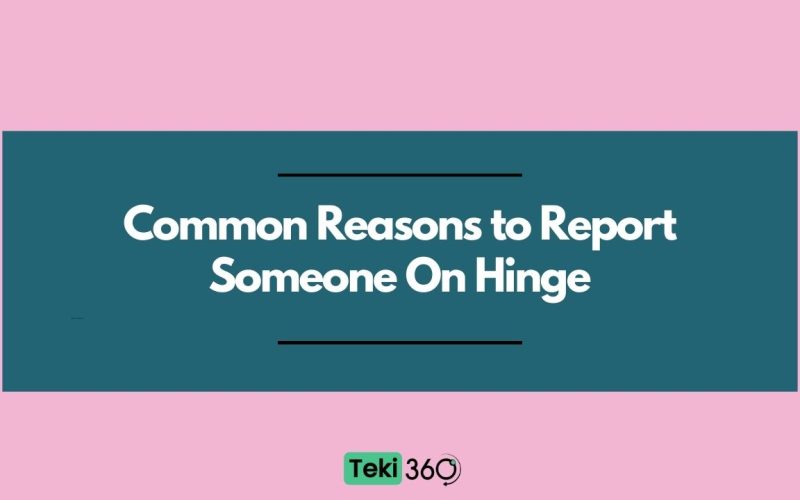As an Amazon Associate, I may earn a small commission from qualifying purchases. Learn more about this.
Table of Contents Show
From morning coffee to evening wind-down, Hinge is often by my side. Most chats are light and fun, but there are days when I realize it’s more than just a chat. It’s about safety and the need to report.
In this article, we talk about the “when moment” to report someone on Hinge
Common Reasons to Report Someone On Hinge
1. Inappropriate Content
Inappropriate content is the unwelcome surprise that can catch any of us off guard.
Imagine one moment, you’re discussing your favorite movies, and the next, you’re staring at explicit content that you never signed up to see.
It’s important to remember here, it’s not you, it’s them.
Inappropriate content isn’t just about lewd messages or revealing photos, though those are certainly part of it.
It extends to offensive language, violent content, and hateful symbols in profile pictures or text.
It’s anything that breaches the boundary of respect and consent.
Hinge prides itself on cultivating a community where users can feel safe and respected.
When this environment is compromised by users who choose to post or share content that is explicit or offensive, it violates the community standards and the trust of its members.
So, what should you do in these uncomfortable situations?
Don’t second-guess yourself. If you feel shocked, unsettled, or violated, it’s time to take action. Report it and even remove them if possible.
Your action prompts a review by the Hinge team, which can then lead to the removal of the content or even the user, if necessary.
2. Harassment
Now, let’s talk about harassment, a term we’ve all heard but might struggle to define in the context of online interactions.
On Hinge, harassment can take many forms, and understanding them is key to maintaining your boundaries effectively.
It might start subtly — perhaps they’re messaging you repeatedly, despite your lack of response or expressed disinterest.
Or it could be more overt, like bombarding you with messages that are aggressive, threatening, or filled with pressure for personal information, photos, or a meet-up.
Harassment can also manifest through stalking behaviors, like attempting to connect with you outside of Hinge without your consent or trying to find out where you live or work.
The bottom line is, harassment is about a lack of respect for your comfort, consent, and personal space. You have the absolute right to end any conversation that makes you feel uneasy, and Hinge supports this wholeheartedly.
Continuing unwanted advances after someone has said ‘no’ is a classic form of harassment.
Should you experience any form of harassment, report it immediately.
Note that this doesn’t extend to weird things like ghosting. Those are not harassments.
3. Scams and Scammers
The digital age, while connecting us in unprecedented ways, has also given rise to a new breed of con artists: the online scammers.
They’re the wolves in sheep’s clothing, and they’ve found their way into spaces like Hinge.
Imagine yourself deep in conversation with someone, sharing laughs and stories. Then, the tone shifts.
They share a heartbreaking story, and your heart goes out to them — right up until they ask for money or your personal information.
That’s the moment the alarm bells start ringing.
Here’s an example of what I mean:

Scammers on dating apps have become increasingly sophisticated, weaving intricate stories to tug at your heartstrings.
However, their ultimate goal remains transparent: they’re after financial gain or sensitive information.
They might claim they need funds for an emergency, ask for details to send you a “gift,” or even promise repayment for your kindness.
In other instances, they might attempt to direct you to external sites or phishing links that harbor malware, aiming to steal your data.
But how can you shield yourself from these deceptive practices?
Trust your instincts. If a story seems too calamitous, a profile too perfect, or a link too random, those are your cues.
And if someone straight-up asks for money? That’s your red flag waving proudly in the breeze. Don’t hesitate to report such accounts immediately.
4. Discrimination
In an ideal world, an app like Hinge would be a melting pot of cultures, identities, and beliefs — a place where love knows no boundaries, and respect is the universal language.
However, the reality can sometimes be starkly different. Discrimination is a bitter reality in online spaces, and dating apps are no exception.
Discrimination on Hinge can manifest in messages that use derogatory language, profiles that express prejudiced views, or even in the rejection or harassment of someone because of their race, religion, sexual orientation, gender identity, disability, or other personal characteristics.
This behavior doesn’t just dampen the spirit of connection that Hinge stands for; it goes against the very fiber of Hinge’s community guidelines.
It’s important to call out and report discriminatory behavior. If you come across a profile propagating hate, or if someone sends you messages that are discriminatory in nature, take action.
Hit that report button without hesitation.
5. Violation of Privacy
Your privacy isn’t just a priority; it’s your right.
However, amidst the excitement of new conversations and budding connections, this right can sometimes be challenged by individuals with less-than-honorable intentions.
It begins subtly — a question about your neighborhood, a request for your full name, or an innocent-seeming plea to switch to a different, often less secure, messaging platform.
Then it escalates, spiraling into outright requests for your home address, personal identification, or financial details.
Sometimes, it’s not even about you; you might stumble upon a profile that’s casually flaunting someone else’s personal information. Either way, it’s a blatant violation of privacy, and it’s unacceptable.
But what can you do in these situations? Take control and report it. Hinge values the privacy of its users deeply and takes such violations seriously.
Furthermore, be mindful of the information you come across on others’ profiles. If you notice someone sharing another person’s private information — whether it’s photos, addresses, or contact details — that’s a violation too. Reporting this isn’t nosy; it’s necessary.
Can you report someone for something that happened outside of Hinge?
The short answer is yes, you absolutely can and you should.
In fact, we have a detailed article on this on this topic.
Here’s why: Hinge is committed to the safety and well-being of its community. That doesn’t stop at the boundaries of the app.
If someone is exhibiting harmful, deceitful, or dangerous behavior, it’s crucial information that the platform needs to be aware of, even if that behavior didn’t directly occur within the app.
When you report an incident that happened outside of Hinge, you’re asked to provide as much detail as possible.
What was said, what was done, any proof you might have (like screenshots or photos), and how it made you feel. This information isn’t just a bunch of facts; it’s a narrative that helps the Hinge team understand the situation better.
But it’s important to mention that these reports are not taken as seriously as the ones on the app.
However, to help Hinge take the issue seriously you can use reverse psychology on the person via Hinge to sort of create evidence or proof.
For instance, if somebody did something bad to you out of the app, try to iterate it on the app with a question of what they did. If they confirm it with their reply, that’s solid evidence you’ve got there.
Conclusion
Hitting ‘report’ isn’t just about protecting yourself; it’s about safeguarding the entire Hinge community. And guess what? Hinge has your back every step of the way. Their user support is there for you, making sure your voice is heard and actions are taken.










